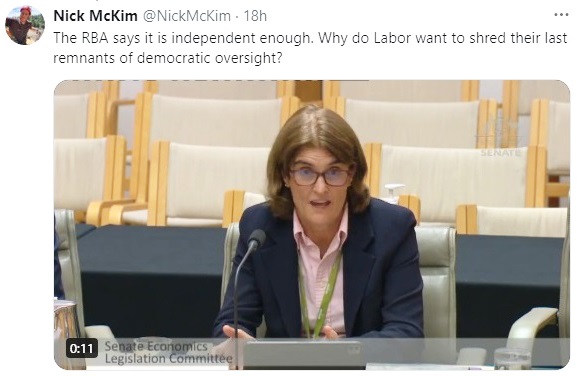The Australian Alert Service is the weekly publication of the Australian Citizens Party.
It will keep you updated on strategic events both in Australia, and worldwide, as well as the organising activities of the Citizens Party.
To subscribe to the Australian Alert Service, it's easy, and it's secure.
Lead Editorial
21 February 2024
Vol. 26 No. 8
Once again, in Senate Estimates hearings on 15 February, a handful of Australian Senators from various parties fought to defend democracy in this country, slugging it out against Reserve Bank Governor Michele Bullock. Even more to the point, the Senators are fighting for the right of the Australian government, on behalf of the Australian people, to fund the development of the country, at a time when it could not be more urgent.
Greens Senator Nick McKim asked Bullock about the proposal to scrap the Section 11 powers in the Reserve Bank Act, the legislation that governs the RBA. That section, as John Kehoe reported in his notable story on the topic in the 15 February Australian Financial Review, amounts to “the legislative power of the treasurer to take control of monetary policy”.
Bullock said that the power had never been used anyway, noting that it was recommended by the review panel because “it was somewhat unusual, internationally. But”, she added, “I think I’m reasonably agnostic.
“I would say from my perspective, since I’ve been engaged with the board and I can’t speak for the past, but as far as I have been engaged with the board, the board takes its decisions independently of government.”
Indeed. So why remove the power?
Likewise, when LNP Senator Gerard Rennick asked Bullock about the proposed removal of Section 36 of the Banking Act, which allows the RBA to direct commercial bank lending into specific areas of the economy, Bullock replied that it is not used anyway.
“We don’t operate like that anymore”, she said. “The financial system is deregulated. … Now, there are still regulations on the banks, obviously, because they’re very important. But we don’t use those powers. We will never use those powers and I see no reason why they should remain.”
The reason for the push to remove those powers that have never been used, is that the time is coming when they will be used! One, because the population will demand they be used, when they start seeing their savings stolen (“bailed in”) to save the banks in the oncoming new financial crisis (p. 13); and two, because increasingly, there are leaders who would be prepared to use them.
As Senator McKim excoriated in a series of tweets, no submitters to the RBA Review pushed for removal of this power, and the RBA is ambivalent: “The only person trying to get rid of @JEChalmers’ ability to fix bad RBA decisions is Jim Chalmers. He wants to completely absolve himself of any responsibility for interest rate rises, and remove any democratic accountability of the bank.”
Furthermore, as we document inside this AAS issue, Chalmers was a key figure assisting the global rise of a new post-GFC era of top-down control over the economies of sovereign nations by the Bank for International Settlements, the bank designed during the Great Depression to enforce austerity on the population in order to save the financial system.
All Statements on the Conduct of Monetary Policy— joint statements of intention usually issued at commencement of a new government by the treasurer and RBA governor—between 1996 (when they started) and 2010 said of Section 11 that “Safeguards like this ensure that monetary policy is subject to the checks and balances inherent and necessary in a democratic system.” (Emphasis added.)
If it was important then to require entrenchment of such safeguards in law, it’s important now—regardless of whether they ever get used! It is no coincidence that the above reference to Section 11 was removed from the 2013 Statement on the Conduct of Monetary Policy, the year that the push for bail-in policy started in earnest. Removal of the power from law is the final element.
Bullock is effectively saying she is agnostic about democracy! Send her a message via your MP—the Treasurer must intervene while he still has the power to do so.
In this issue:
- RBA governor ‘agnostic’ about democracy!?
- Senate inquiry into regional bank closures comes to ‘banking desert’ South Australia
- PwC and ASIC scandals highlight regulatory capture
- Historic vote in Australian parliament on Julian Assange
- USUKA: The hidden history of AUKUS
- Betrayed!
- South Africa asks ‘additional measures’ to stop imminent genocide in Rafah
- The three (Labor) stooges behind bail-in
- Chalmers’ inadvertent bail-in brag
- Will US debt bubble crash the global dollar?
- Keep up the heat on all campaigns—it’s working!
- Aussie viewers very moved by Mr Bates vs the Post Office!
- ASPI panics over government funding review
- ALMANAC: The Australian Precedents for a Hamiltonian Credit System - Part II
Click here to find out how to subscribe. For freely available AAS articles, click here.
Click here for the archive of previous issues of the Australian Alert Service








